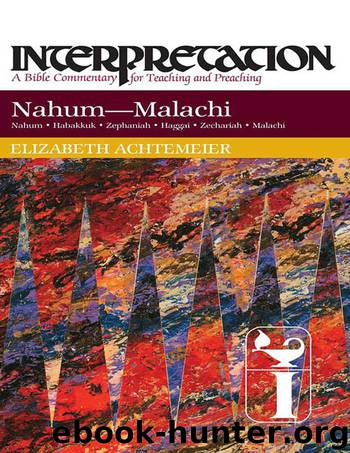Nahum--Malachi: Interpretation: A Bible Commentary for Teaching and Preaching by Elizabeth Achtemeier

Author:Elizabeth Achtemeier
Language: eng
Format: azw
Publisher: Presbyterian Publishing Corporation
Published: 1988-10-31T23:00:00+00:00
Haggai 2:10–19
The ultimate danger of temple building, and indeed of all works of religion, is the temptation to become self-righteous: to believe that association with the things of God automatically communicates moral purity, right judgment, unconquerable power—all those qualities associated with holiness, that is, with the total otherness of God. How many futile crusades have been launched on the basis of such blind assumptions! How many communities have been split by those claiming such rightness! How many smug presuppositions of such superiority have prevented the communication or the receipt of the gospel!
Haggai addresses this temptation with a parable and its explanation delivered almost nine weeks after 2:1–9, on December 18. The question is, Does the very act of rebuilding the temple make the Judeans a morally pure, acceptable community in the eyes of God? Having dealt with God’s holy place, have they themselves become holy?
To answer the question, Haggai is commanded by God to ask the priests how holiness is communicated (for the relevant laws, see Exod. 29:37; Lev. 6:26, 27; 10:10; cf. Ezek. 44:19; Matt. 9:21; 14:36; 23:19). If holy meat, that is, meat set aside for sacrifice, is carried in a garment, does that garment communicate the holiness to other food that it touches? No. And if the holy meat of the sacrifice is touched by one who has been made ritually impure by some means, it itself becomes unholy and unfit for use in sacrifice. In short, sinfulness contaminates everything and everyone, and because the Judeans are sinful people, their sin contaminates even the temple and its worship. Just because they are handling the things of God, they have not become suddenly morally pure and acceptable in God’s eyes.
Neither does our familiarity with the things of God’s church—Bible, sacraments, doctrine, ritual—automatically make us into pure and righteous Christians. To speak often of the Lord, to quote the Scriptures, even to participate in worship and sacrament lend to us no magical claim to be sinless before our God and other people. Jesus told what he thought of such claims in the parable of the Pharisee and tax collector, just as Haggai here proclaims the same lesson in his parable of holiness. Indeed, to drive home the point Haggai once again recalls the sin of the past and God’s covenant curses on it and the failure of the people to repent and return to their God (vv. 16–17; cf. Amos 4:6–11).
Yet nevertheless, despite the Judeans’ sin, God works his stunning reversal (vv. 18, 19). From this day, December 18, on, he will accept them and forgive them and dwell in their temple and shower his favor on them. Verse 19b should be read as a question about the future: “Will the vine …?” There had been no new harvest of vine and fig, of pomegranate and olive since the foundation of the temple was laid. The autumn rains began in Judah in mid-October, and when the ground had softened, the seed was sown and then ploughed under. The Judeans do not know by the time of this parable whether their seeds and vines and trees will bear or not.
Download
This site does not store any files on its server. We only index and link to content provided by other sites. Please contact the content providers to delete copyright contents if any and email us, we'll remove relevant links or contents immediately.
| Adult Ministry | Children's Ministry |
| Counseling & Recovery | Discipleship |
| Evangelism | Missions & Missionary Work |
| Preaching | Sermons |
| Youth Ministry |
Victory over the Darkness by Neil T. Anderson(2860)
The Rape Of Nanking by Iris Chang(2813)
Chosen by God by R. C. Sproul(2161)
Habits of Grace by David Mathis(1976)
Crash the Chatterbox by Steven Furtick(1973)
Knowing God by J.I. Packer(1854)
How To Be Born Again by Billy Graham(1777)
A Prophet with Honor by William C. Martin(1717)
Gospel-Shaped Marriage by Chad van Dixhoorn(1716)
Peace with God by Billy Graham(1683)
Confronting Christianity by Rebecca McLaughlin(1587)
God's Smuggler by Brother Andrew(1542)
Angel Dreams by Virtue Doreen Virtue Melissa(1474)
Whisper by Mark Batterson(1452)
The School of Biblical Evangelism by Ray Comfort(1437)
Missionaries by Norman Lewis(1427)
The Truth War by John MacArthur(1422)
The Poems of Rowan Williams by Rowan Williams(1354)
Do Greater Things by Robby Dawkins(1324)
